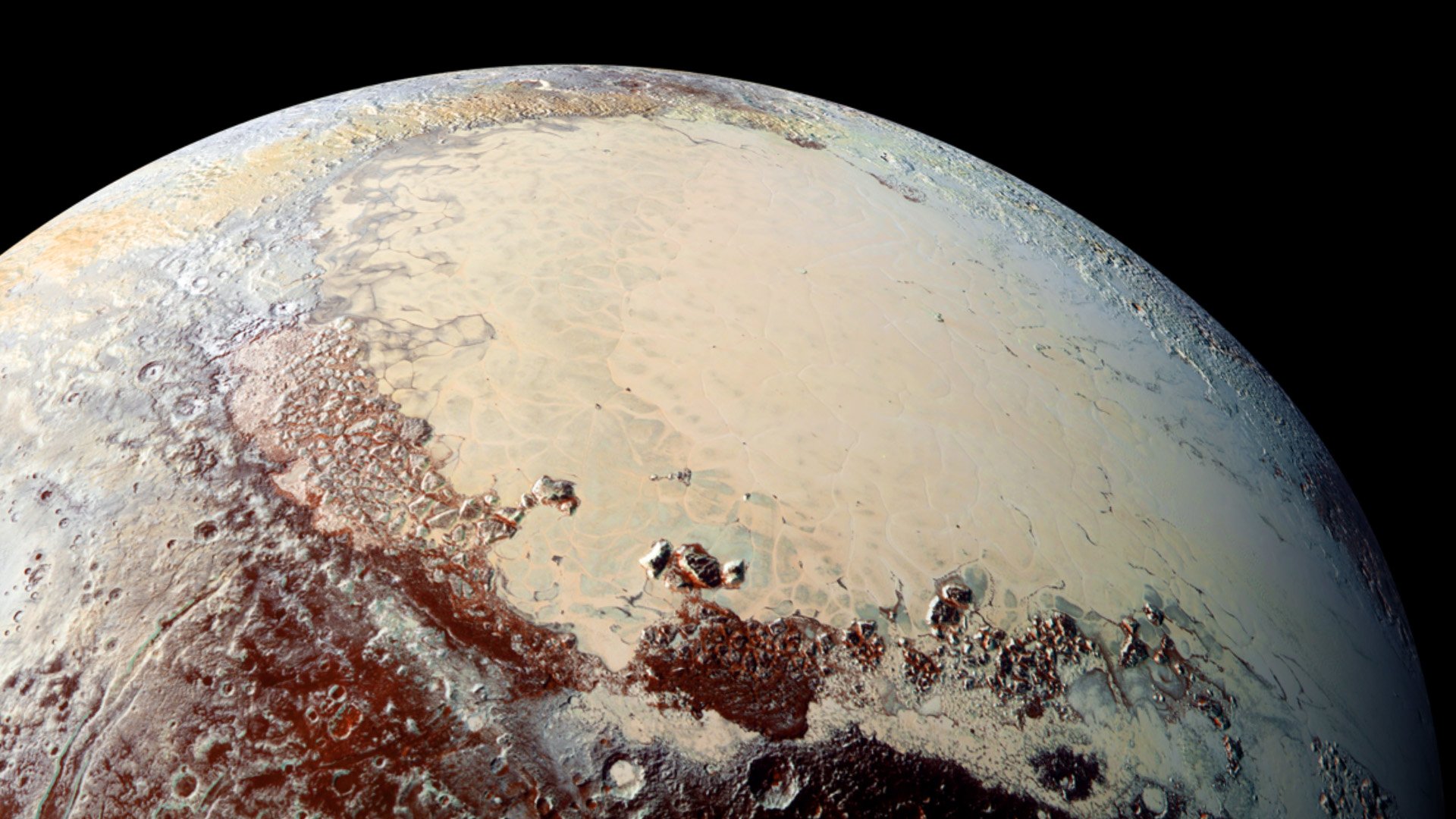The last stop in a literary Grand Tour portrays Pluto the way it really is

NASA’s New Horizons mission to Pluto has forced astronomers to rewrite their textbooks — but that’s not all. New Horizons also compelled space scientist Les Johnson to rewrite a novel.
Johnson was tasked with taking notes left behind by the famed science-fiction writer and editor Ben Bova, who died in 2020, and turning them into a novel set on Pluto to close out Bova’s Grand Tour series of solar system tales.
In the material Bova had written for *Pluto*, he described a rocky world with just a little ice. However, when Johnson sent those notes to planetary scientist Alan Stern, the New Horizons mission’s principal investigator, Stern had to set him straight.
“His first comment back to me was, ‘We never found anything on Pluto that was anything like that,’” Johnson says in the latest episode of the *Fiction Science* podcast. “And so I realized at that point that I was going to have to go back and revise the science behind the story of the environment on Pluto.”
The result is one of the first works of fiction to provide detailed descriptions of Pluto’s true surroundings — right down to the orange-tinged ice sheet of Sputnik Planitia and the dark, dirty spot on Charon, Pluto’s largest moon.
—
### Blending Science and Fiction
*Pluto* capitalizes on Johnson’s experience as a NASA researcher and as an author of nonfiction science books, science-fiction novels, and short stories. He was chosen to complete Bova’s final project partly because the two had collaborated on an earlier novel, *Rescue Mode*, more than a decade ago.
To be sure, there’s a lot of fiction blended in with the science in *Pluto*. The mix roughly reflects the proportion of rock to ice on the dwarf planet — approximately 30% solid rock and 70% lighter, icy material.
The novel is set in the 22nd century when humans are beginning to merge with machines and are receiving data from Proxima Centauri b. The spark that sets the novel’s plot in motion is the detection of an alien artifact deep beneath the icy surface of Pluto’s region known as Sputnik Planitia.
Scientists and military leaders from the U.S. Space Force, China, and Russia struggle to deal with the events set in motion by that discovery. There’s even a shipboard romance that develops between two of the main characters.
“Pluto is the background for the book,” Johnson explains. “What they find on Pluto is the source of the drama in the book.”
—
### Exploring Humanity in Space
Johnson also had another objective in mind—one he believes Bova was heading toward as well.
“As we expand into the solar system, we won’t necessarily be leaving behind here on Earth our humanity, both the good and the bad. Our rivalries, our personal tragedies, as well as temptations… will go with the folks that take these arduous, long trips.”
He envisions that in 100 or 200 years, while the U.S. might have changed shape, it will likely still exist. Other countries such as China, Russia, and probably India will remain significant space powers.
—
### Themes of AI and Societal Challenges
A couple of twists in the novel reflect Johnson’s views on life in the 22nd century.
One of the characters is a scientist who, after a horrible accident, has had his brain merged with an AI. “He’s essentially a digital consciousness that can transfer from machine to machine and retain his self, his human volition and thoughts, augmented by AI,” Johnson says.
If such entities come into existence, Johnson thinks they might pose challenges. “I think it’s going to be extremely utilitarian, and I think it will want to make decisions based on utility rather than compassion and humanity,” he explains. “Will we still have our humanity and our empathy, or will we also become utilitarian?”
In another passage, Johnson incorporates a reference to virtual reality (VR) addiction, a societal issue that may be scarily close to present-day reality.
“I am extremely concerned by it,” Johnson admits. “This has been a focus of some of my nonfiction writing as well as my fiction. I really see how much our younger generation — young men in particular, but not exclusively — are seduced by online gaming, and it takes away a lot of the desire to go out and actually do things.”
—
### What About Pluto’s Planet Status?
Where does Johnson stand on the enduring controversy: Is Pluto a planet or not?
He says he’s fine with calling Pluto a dwarf planet rather than a “full-blown planet.”
“It’s just a matter of nomenclature for me,” Johnson explains. “As we found all these other objects out there in the Kuiper Belt which are Pluto-like, they had to do something when they started encountering all these other objects.”
“I’m excited by all these other dwarf planets that we see beyond Pluto, and I don’t have too much trouble classifying Pluto in with that.”
—
### Inspiring Wonder
Ultimately, Johnson hopes *Pluto* will leave readers with a sense of wonder.
“That would be my mental model of what I would like readers of this book to say to themselves when they finish it: ‘Wow, what is out there?’”
He adds, “The scientist in me — the one who’s worked at NASA for 35 years and just retired — wants to tell them, ‘Great, I want to help answer that. Go tell your congressman to send more money so we can figure out what’s out there.’ So I have to admit, there’s a bit of a selfish mode in there.”
—
### About Les Johnson
Les Johnson retired from his day job as chief technologist at NASA’s Marshall Space Flight Center in September but remains active in the space industry as CEO of Infinite Frontiers Consulting.
His most recently published science-fiction novel, *Crisis at Proxima*, co-written with Travis S. Taylor, has just been released in paperback. He is currently working on the next novel, *Monster Hunter: The Alien Files*, co-written with Larry Correia, as well as an upcoming nonfiction book about space exploration.
—
*For more about books that focus on Pluto, Ben Bova’s Grand Tour series, and Les Johnson’s insights on interstellar flight, check out the original version of this story at Cosmic Log.*
https://www.universetoday.com/articles/the-last-stop-in-a-literary-grand-tour-portrays-pluto-the-way-it-really-is







